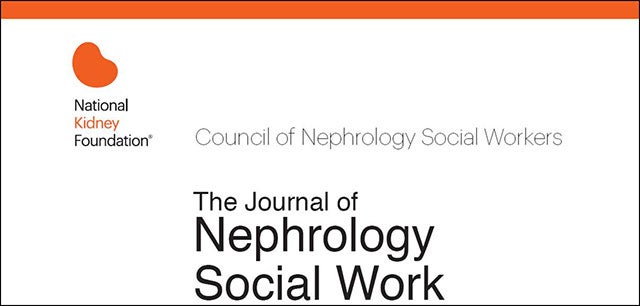The Journal Of Nephrology Social Work - Volume 41, Issue 1 (2017)

Table of Contents
Substance Use Disorders and Kidney Disease:
Implications for Nephrology Social Work Practice
Teri Browne, PhD, MSW, NSW-C; Kristen D. Seay, PhD, MSW; Aidyn Iachini, PhD, MSW; Dana DeHart, PhD, MA; Stephanie Clone, MSW; Caroline Pantridge, MPH; Aliza Petiwala, MSW, MPH, University of South Carolina College of Social Work, Columbia, SC
Substance use disorders (SUDs) are a public health issue as well as a significant psychosocial barrier resulting in chronic kidney disease outcomes such as mortality and morbidity. Nephrology social workers need a general understanding of SUDs, SUD issues pertinent to patients with kidney disease, and best practices for working with such patients and their family members. This article provides an overview of SUDs, details SUD-related conditions in kidney disease populations, discusses implications for nephrology social work practice, and makes recommendations for such care.
Download
Chronic Kidney Disease Self-Management "Helps" and Hindrances in Older African-American and White Individuals Undergoing Hemodialysis:
A Brief Report
Tiffany R. Washington, PhD, MSW, University of Georgia School of Social Work; Michael A. Robinson, PhD, MSSW, University of Georgia School of Social Work, Athens, GA; Tyrone C. Hamler, MSW, LSW, Case Western Reserve University Jack, Joseph and Morton Mandel School of Applied Social Sciences, Cleveland, OH; Sheena A. Brown, MSW, U.S. Renal Care, Charlotte, NC
This brief report summarizes chronic kidney disease self-management "helps and hindrances" among older African American and White individuals undergoing in-center hemodialysis. Qualitative data from 107 interviews were analyzed using steps of content analysis. Seven "helps" and five hindrances were revealed. The "helps" were: following treatment orders/adherence; a social network; exercise and physical activity; faith practices/beliefs; distractions during treatment; maintaining a positive attitude; and resting. The hindrances were: functional limitations; managing co-occurring conditions; diet and fluid restrictions; feeling fatigued on treatment days; and social network/social activities. The authors conclude with five practice recommendations for increasing self-management behaviors among individuals undergoing hemodialysis.
Download
Post-transplant Life:
Web-posted Stories of Parents of Children with Kidney Transplants
Ching-Shu J. Fang, PhD, College of Social Work, University of Kentucky, Lexington, KY
Numerous studies have focused on understanding the well-being and life experiences of parents of children with varying special healthcare needs. However, only a few studies analyze the needs and issues of parents of children with chronic kidney disease (CKD) or a kidney transplant. This study explores the unique life experiences of these parents and identifies important factors that help families enhance their quality of life. Unlike previous studies, this investigation discovers that the majority of parents reported positive post-kidney-transplant outcomes along with positive perceptions of their children's special needs. This positive tone of web-posting stories is similar to previous research indicating that personal storytelling brings to light both resilience and therapeutic benefits. Thus, this study suggests that parental storytelling can be a useful psychosocial intervention that promotes the well-being of pediatric transplant recipients and their family members. Considering that more than half of parents in the study utilized the Internet to connect to other parents with similar experiences, professionals can encourage or incorporate forms of online interaction for parents to obtain information and support.
Download
National Kidney Foundation 2017 Spring Clinical Meetings Abstracts
April 18 – 22, 2017
Download